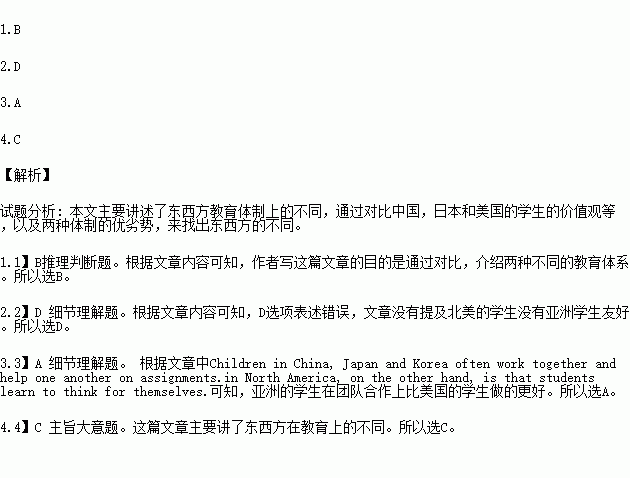题目内容
In a society such as the United States or Canada, which has many national, religious and cultural differences, people highly value individualism—the differences among people. Teachers place a lot of importance on the qualities that make each student special. The educational systems in these countries show these values. Students do not memorize all possible basic knowledge. Instead, they work individually and find answers by themselves. There is often discussion in the classroom. At an early age, students learn to form their own ideas and opinions.
In most Asia societies, by contrast, the people have the same language, history and culture. Perhaps for this reason, the educational system in much of the orient reflects society's belief in group goals and purposes rather than individualism. Children in China, Japan and Korea often work together and help one another on assignments.
There are advantages and disadvantages of both systems of education. For example, one advantage of the system in Japan is that students there learn much more about maths, physics, biology and chemistry than American students by the end of high school. They also study more hours each day and more days each year than North Americans do. The system is difficult, but it prepares students for a society that values discipline and self-control. There is, however, a disadvantage. Memorization is an important learning method in Japanese schools, yet many students say that after an exam, they forget much of the information that they have memorized.
The advantage of the educational system in North America, on the other hand, is that students learn to think for themselves. The system prepares them for a society that values creative ideas. There is, however, a disadvantage. When students graduate from school, they haven't memorized as many basic rules and facts as students in other countries have.
1.The writer's purpose of writing this passage is________.
A. to share his idea with others in a new way
B. to introduce two different systems of education through contrast
C. to criticize the society that values memorization
D. to prepare students for society
2.Which is NOT true according to the passage?
A. The system of education in the West is more creative than that in the East.
B. Japanese students learn much more about science than American students.
C. Canadian students are more individual than Korean students.
D. Students in North America are not as friendly as those in Asia.
3.From the facts, we can infer that________.
A. Asian students are more likely to do better in teamwork than American students
B. Chinese students are more hard-working in their studies than Mexican students
C. the Western educational system is much better than the Eastern educational system
D. the Eastern educational system is as difficult as the Western educational system
4.What is the best title of the passage?
A. Advantages and disadvantages of educational system
B. The value of individualism
C. Educational system—an obvious difference between the East and the West
D. Memorization—an important learning method
 名校联盟快乐课堂系列答案
名校联盟快乐课堂系列答案 黄冈创优卷系列答案
黄冈创优卷系列答案
